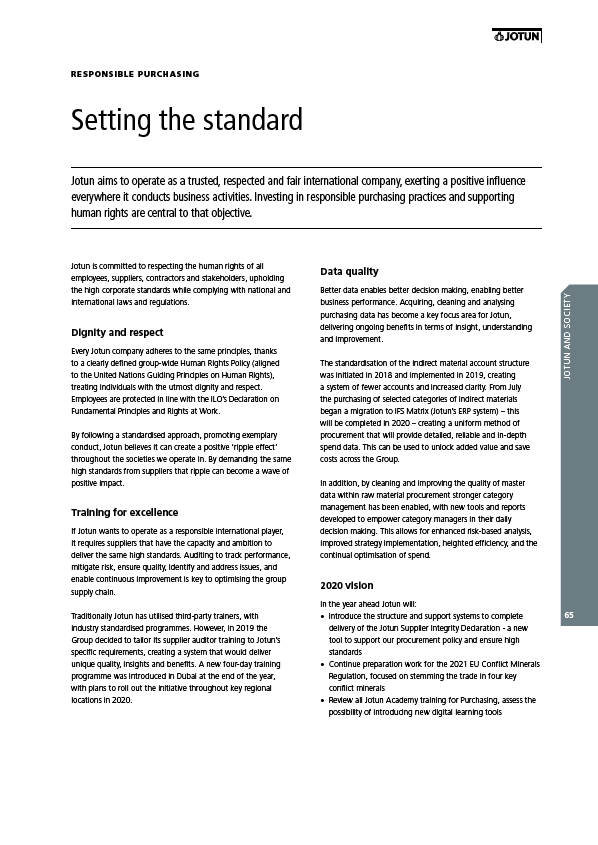
JOTUN AND SOCIETY
65
Setting the standard
Jotun aims to operate as a trusted, respected and fair international company, exerting a positive influence
everywhere it conducts business activities. Investing in responsible purchasing practices and supporting
human rights are central to that objective.
Jotun is committed to respecting the human rights of all
employees, suppliers, contractors and stakeholders, upholding
the high corporate standards while complying with national and
international laws and regulations.
Dignity and respect
Every Jotun company adheres to the same principles, thanks
to a clearly defined group-wide Human Rights Policy (aligned
to the United Nations Guiding Principles on Human Rights),
treating individuals with the utmost dignity and respect.
Employees are protected in line with the ILO’s Declaration on
Fundamental Principles and Rights at Work.
By following a standardised approach, promoting exemplary
conduct, Jotun believes it can create a positive ‘ripple effect’
throughout the societies we operate in. By demanding the same
high standards from suppliers that ripple can become a wave of
positive impact.
Training for excellence
If Jotun wants to operate as a responsible international player,
it requires suppliers that have the capacity and ambition to
deliver the same high standards. Auditing to track performance,
mitigate risk, ensure quality, identify and address issues, and
enable continuous improvement is key to optimising the group
supply chain.
Traditionally Jotun has utilised third-party trainers, with
industry standardised programmes. However, in 2019 the
Group decided to tailor its supplier auditor training to Jotun’s
specific requirements, creating a system that would deliver
unique quality, insights and benefits. A new four-day training
programme was introduced in Dubai at the end of the year,
with plans to roll out the initiative throughout key regional
locations in 2020.
Data quality
Better data enables better decision making, enabling better
business performance. Acquiring, cleaning and analysing
purchasing data has become a key focus area for Jotun,
delivering ongoing benefits in terms of insight, understanding
and improvement.
The standardisation of the indirect material account structure
was initiated in 2018 and implemented in 2019, creating
a system of fewer accounts and increased clarity. From July
the purchasing of selected categories of indirect materials
began a migration to IFS Matrix (Jotun’s ERP system) – this
will be completed in 2020 – creating a uniform method of
procurement that will provide detailed, reliable and in-depth
spend data. This can be used to unlock added value and save
costs across the Group.
In addition, by cleaning and improving the quality of master
data within raw material procurement stronger category
management has been enabled, with new tools and reports
developed to empower category managers in their daily
decision making. This allows for enhanced risk-based analysis,
improved strategy implementation, heighted efficiency, and the
continual optimisation of spend.
2020 vision
In the year ahead Jotun will:
• Introduce the structure and support systems to complete
delivery of the Jotun Supplier Integrity Declaration - a new
tool to support our procurement policy and ensure high
standards
• Continue preparation work for the 2021 EU Conflict Minerals
Regulation, focused on stemming the trade in four key
conflict minerals
• Review all Jotun Academy training for Purchasing, assess the
possibility of introducing new digital learning tools
RESPONSIBLE PURCHASING